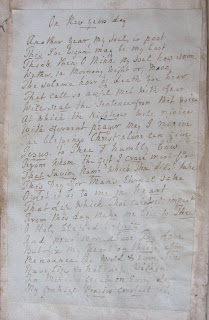Richard Allestree, The Ladies Calling in two Parts, by the author of the Whole duty of man, &c. Oxford: Printed at the Theater, [1705]
[24], 270, [2] p., [1] leaf of plates : ill. ; 20 cm. (8vo).
Renaissance Center copy is in contemporary red paneled morocco (frontispiece lacking; water stains to lower inner portion of pages throughout; leaf 2L4 pasted to rear free endpaper); in phase box; engraved bookplate of Elma Palmer (printed in brown) on front pastedown; signature "Anne Fonnereau Her Book Feb 23d 1755/34" in ink on front flyleaf; signature "Phebe Fonnereau" in pencil on verso of front free endpaper; signature (partly erased) "[---?] Oliver" in ink on verso of front free endpaper; price, not clearly associated with any name, "Pret: 0:2:0" on verso of front free endpaper; ms. poem "On New Year’s Day," mounted on front flyleaf.
This item offers a great example of how early modern readers customized their personal copies of books with unique manuscript content. Two ownership inscriptions link the book to female members of the Fonnereau family in the mid-eighteenth century.
It seems likely that this is the Anne Fonnereau (nèe Banbury, d. 1782) who married Claudius Fonnereau (d. 1785) in 1728; together they had thirteen children, including Phebe, who was born on December 29, 1747. Anne and Claudius had a daughter Ann, but since she was born in 1731, I doubt it is she who left the inscription. It is also possible this is Anne Fonnereau, ("my father's wife" in Claudius's words), who he describes as a "Grand Mother" in 1738. This information comes from MS records in a bible related to the Fonnereau family; its contents are transcribed in Joseph Jackson Howard, ed., Miscellanea genealogica et heraldica, Second series, volume 5 (1894), 281-3.
The manuscript poem affixed opposite the title page, entitled "On New years day," seems to suggest the book was presented as a New Year's gift; the genre of the New Year's gift poem was quite commonplace and fashionable at this time, and the book's beautiful red goatskin binding suggests it may be a presentation copy.
But the content of the poem itself does not focus on the act of giving, nor does its speaker (presumably the gift-giver) mention a gift-recipient.
On New years day
Another year, my soul, is past
This I’ve begun may be my last
Think then O think my soul how soon
Wether, in Morning, Night or, Noon,
The solemn howr of death you hear
That call so awful met with fear
Will seal the sentence from that voice
At which the Righteous will rejoice
With fervent prayer May I receive
The blessings Christ alone can give
Jesus. to Thee I humbly bow
From whom the gift I crave must flow
That Saving Name Which Thou didst take
This Day for Man’s eternal sake
O: Let it be to me in heart
That Life Which Thou can well impart
From this day Make me live to Thee
O Holy blessed Trinity
And never more abuse Thy dove
But fix my heart on things above
Renounce the world & every sin
Have life & holiness Within
For Mercies great [?] on Every day
My grateful Praises constant pay.
Another year, my soul, is past
This I’ve begun may be my last
Think then O think my soul how soon
Wether, in Morning, Night or, Noon,
The solemn howr of death you hear
That call so awful met with fear
Will seal the sentence from that voice
At which the Righteous will rejoice
With fervent prayer May I receive
The blessings Christ alone can give
Jesus. to Thee I humbly bow
From whom the gift I crave must flow
That Saving Name Which Thou didst take
This Day for Man’s eternal sake
O: Let it be to me in heart
That Life Which Thou can well impart
From this day Make me live to Thee
O Holy blessed Trinity
And never more abuse Thy dove
But fix my heart on things above
Renounce the world & every sin
Have life & holiness Within
For Mercies great [?] on Every day
My grateful Praises constant pay.
Rather, the poem is intensely personal and devotional in nature, seemingly written by an older person who feels closer to death with each passing year ("This I've begun may be my last"). The images evoke a close personal and spiritual relationship between the speaker and Christ that is built upon prayer, meditation, and divine blessings.
I am fairly certain the poem is in the hand of Anne Fonnereau, who left her inscription on an endpaper, although the subject matter of the poem suggests the poet may be the "Grand Mother" Anne Fonnereau, who would have been an old woman at this time.
I have been unable to identify the Elma Palmer whose wreath-and-ribbon style bookplate is displayed on the book's front pastedown. I suspect that the manuscript price (pret: 0-2-0, or 2 shillings) found on one of the endpapers refers to the book's second-hand value.


















Great photos. Do you know of any affordable versions of this book? I am looking to purchase a copy, not as a collector, but only to read history. So far I have not found any modern reprints or free online editions. If you know of a source, I would love to know. Thanks. mtshfb@mail.missouri.edu
ReplyDelete